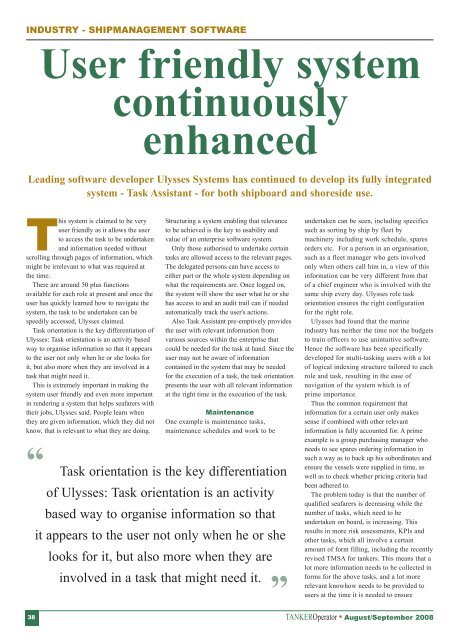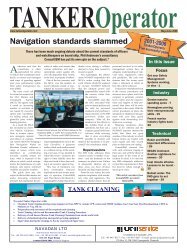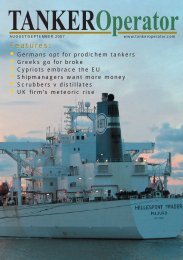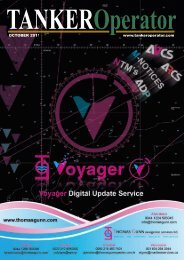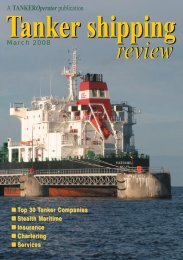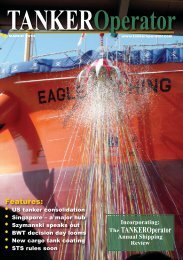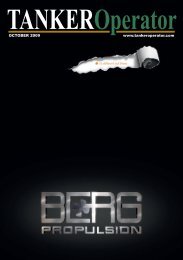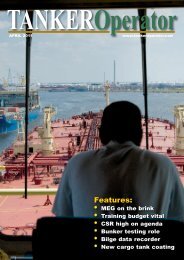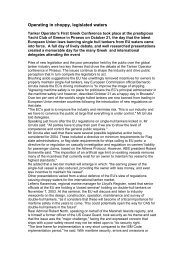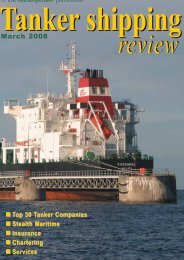Features: - Tanker Operator
Features: - Tanker Operator
Features: - Tanker Operator
Create successful ePaper yourself
Turn your PDF publications into a flip-book with our unique Google optimized e-Paper software.
INDUSTRY - SHIPMANAGEMENT SOFTWARE<br />
38<br />
User friendly system<br />
continuously<br />
enhanced<br />
Leading software developer Ulysses Systems has continued to develop its fully integrated<br />
system - Task Assistant - for both shipboard and shoreside use.<br />
This system is claimed to be very<br />
user friendly as it allows the user<br />
to access the task to be undertaken<br />
and information needed without<br />
scrolling through pages of information, which<br />
might be irrelevant to what was required at<br />
the time.<br />
There are around 50 plus functions<br />
available for each role at present and once the<br />
user has quickly learned how to navigate the<br />
system, the task to be undertaken can be<br />
speedily accessed, Ulysses claimed.<br />
Task orientation is the key differentiation of<br />
Ulysses: Task orientation is an activity based<br />
way to organise information so that it appears<br />
to the user not only when he or she looks for<br />
it, but also more when they are involved in a<br />
task that might need it.<br />
This is extremely important in making the<br />
system user friendly and even more important<br />
in rendering a system that helps seafarers with<br />
their jobs, Ulysses said. People learn when<br />
they are given information, which they did not<br />
know, that is relevant to what they are doing.<br />
“<br />
Structuring a system enabling that relevance<br />
to be achieved is the key to usability and<br />
value of an enterprise software system.<br />
Only those authorised to undertake certain<br />
tasks are allowed access to the relevant pages.<br />
The delegated persons can have access to<br />
either part or the whole system depending on<br />
what the requirements are. Once logged on,<br />
the system will show the user what he or she<br />
has access to and an audit trail can if needed<br />
automatically track the user's actions.<br />
Also Task Assistant pre-emptively provides<br />
the user with relevant information from<br />
various sources within the enterprise that<br />
could be needed for the task at hand. Since the<br />
user may not be aware of information<br />
contained in the system that may be needed<br />
for the execution of a task, the task orientation<br />
presents the user with all relevant information<br />
at the right time in the execution of the task.<br />
Maintenance<br />
One example is maintenance tasks,<br />
maintenance schedules and work to be<br />
Task orientation is the key differentiation<br />
of Ulysses: Task orientation is an activity<br />
based way to organise information so that<br />
it appears to the user not only when he or she<br />
looks for it, but also more when they are<br />
involved in a task that might need it.<br />
”<br />
undertaken can be seen, including specifics<br />
such as sorting by ship by fleet by<br />
machinery including work schedule, spares<br />
orders etc. For a person in an organisation,<br />
such as a fleet manager who gets involved<br />
only when others call him in, a view of this<br />
information can be very different from that<br />
of a chief engineer who is involved with the<br />
same ship every day. Ulysses role task<br />
orientation ensures the right configuration<br />
for the right role.<br />
Ulysses had found that the marine<br />
industry has neither the time nor the budgets<br />
to train officers to use unintuitive software.<br />
Hence the software has been specifically<br />
developed for multi-tasking users with a lot<br />
of logical indexing structure tailored to each<br />
role and task, resulting in the ease of<br />
navigation of the system which is of<br />
prime importance.<br />
Thus the common requirement that<br />
information for a certain user only makes<br />
sense if combined with other relevant<br />
information is fully accounted for. A prime<br />
example is a group purchasing manager who<br />
needs to see spares ordering information in<br />
such a way as to back up his subordinates and<br />
ensure the vessels were supplied in time, as<br />
well as to check whether pricing criteria had<br />
been adhered to.<br />
The problem today is that the number of<br />
qualified seafarers is decreasing while the<br />
number of tasks, which need to be<br />
undertaken on board, is increasing. This<br />
results in more risk assessments, KPIs and<br />
other tasks, which all involve a certain<br />
amount of form filling, including the recently<br />
revised TMSA for tankers. This means that a<br />
lot more information needs to be collected in<br />
forms for the above tasks, and a lot more<br />
relevant knowhow needs to be provided to<br />
users at the time it is needed to ensure<br />
TANKER<strong>Operator</strong> � August/September 2008


